A Syrian energy official told Reuters that Syria exported 600,000 barrels of heavy crude oil on Monday from the port of Tartus as part of a deal with a trading company, marking the first known official export of Syrian oil in 14 years.
Syria used to export 380,000 barrels of oil daily in 2010, a year before protests against Bashar al-Assad’s rule turned into a war that lasted nearly 14 years, devastating the country’s economy and infrastructure, including crude oil production.
Assad was ousted in December last year, and the succeeding government pledged to revive Syria’s economy.
Riyad Jubasi, Deputy Director of the General Directorate of Oil and Gas at the Syrian Ministry of Energy, told Reuters that the company B-Serv Energy purchased the heavy crude oil.
Reuters was unable to reach B-Serv for comment.
The Syrian Ministry of Energy said in a written statement that the oil was exported aboard the tanker “Nisos Christiana.”
Jubasi mentioned the oil was extracted from several Syrian fields but did not specify which ones.
Most Syrian oil fields are located in the northeast, inside areas controlled by Kurdish authorities. These authorities began supplying oil to the central government in Damascus in February.
Control over oil fields shifted multiple times during the Syrian war, and U.S. and European sanctions complicated legitimate export and import operations. Sanctions remained in place for several months after Assad’s removal, making energy imports difficult for the new Syrian administration.
However, after U.S. President Donald Trump issued an executive order last June lifting U.S. sanctions on Syria, companies based in the United States began planning to assist in exploring and extracting oil and gas in Syria.
Syria also signed a memorandum of understanding worth $800 million with DP World to develop, manage, and operate a multi-purpose terminal in Tartus, after canceling a contract with a Russian company that managed the port during Assad’s rule.
IAEA Finds Uranium Traces
The United Nations’ International Atomic Energy Agency (IAEA) reported to member states on Monday that it found traces of uranium in Syria during its investigation of a building destroyed by Israel in 2007, which the agency has long suspected was an undeclared nuclear reactor.
The government of ousted Syrian President Bashar al-Assad said the Deir ez-Zor site housing the building was a conventional military base.
The IAEA concluded in 2011 that the building was “likely” a secretly built reactor that Damascus should have declared.
In the confidential report seen by Reuters, the agency said it has been trying since then to reach a conclusive result and last year took environmental samples at three unnamed sites “allegedly functionally related” to Deir ez-Zor.
The agency found “a large number of natural uranium particles in samples taken at one of the three sites. Analysis indicated the uranium was anthropogenic, meaning it was produced as a result of chemical processing.”
The term “natural” means the uranium was not enriched. The report did not conclude what the findings imply.
The report said, “The current Syrian authorities indicated they have no information that could explain the presence of these uranium particles,” adding the new government allowed the agency to revisit the site in June this year to take more environmental samples.
In a meeting that month between IAEA Director General Rafael Grossi and Syrian President Ahmad al-Shar’a, “Syria agreed to cooperate with the agency, with full transparency, to address Syria’s past nuclear activities,” according to the report.
During that meeting, Grossi requested Syria’s help to return to Deir ez-Zor “in the coming months to conduct further analyses, access relevant documents, and speak to those involved in Syria’s past nuclear activities.”
The report said the agency still plans to visit Deir ez-Zor and will evaluate the sample results.
It stated, “Once this process is completed and the results evaluated, there will be an opportunity to clarify and resolve outstanding safeguards issues related to Syria’s past nuclear activities and close the matter.”
Talk Show
The Jaafar Talk show was recorded on Deutsche Welle (DW) channel for the first time from the Syrian capital Damascus, hosting many Syrian officials, activists, intellectuals, journalists, and dozens of audience members, continuing late into Sunday night/Monday.
The episode, recorded in the historic Al-Azem Palace square in old Damascus, had a unique atmosphere far from studio recordings.
The program discussed the disappeared or missing persons, minorities in Syria, parliamentary elections, and the return of Syrians from Germany.
The show hosted the Minister of Emergency and Disasters, Raed Al-Saleh, who confirmed that the missing persons file remains the most prominent after the fall of Assad’s regime.
Minister Al-Saleh noted that “the number of missing persons exceeds 130,000 and the government has formed a national commission to search for the missing, which needs time before its results appear.”
He added, “The government has heavy files but all are priorities, including the return of internally and externally displaced persons. More than 4.1 million people have returned to Syria, and over one million internally displaced persons have returned to their cities and villages amid challenges related to services provided to the displaced and the return of refugees, from schools to health to basic services.”
The other topic in the episode was the parliamentary elections, which are currently a hot topic in Syria. The media spokesperson for the election committee, Dr. Nawar Najm, explained the difficulty of conducting direct parliamentary elections due to the situation in Syria, including the absence of civil registries and the reliance on an electoral mechanism through electoral bodies chosen from local community representatives. Also, the provinces of Sweida, Raqqa, and Hasakah are excluded from the elections, and members of parliament for those areas may be appointed due to the impossibility of elections there.
The last segment featured experiences of Syrians who lived in Germany and returned to their country after the liberation and fall of Assad’s regime.



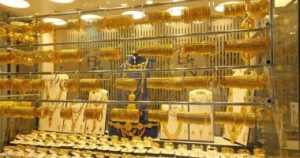


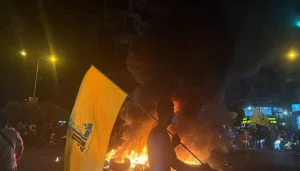
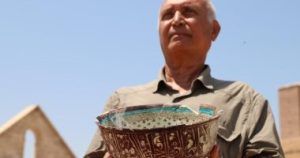

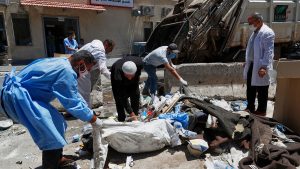
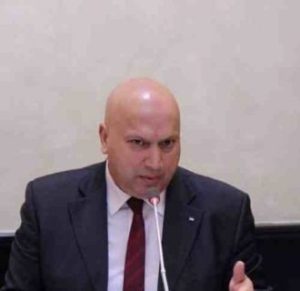


Recommended for you
Exhibition City Completes About 80% of Preparations for the Damascus International Fair Launch
Unified Admission Applications Start Tuesday with 640 Students to be Accepted in Medicine
Talib Al-Rifai Chronicles Kuwaiti Art Heritage in "Doukhi.. Tasaseem Al-Saba"
Al-Jaghbeer: The Industrial Sector Leads Economic Growth
Ministry of Media Announces the 10th Edition of 'Media Oasis'
Afghan Energy and Water Minister to Al Jazeera: We Build Dams with Our Own Funds to Combat Drought